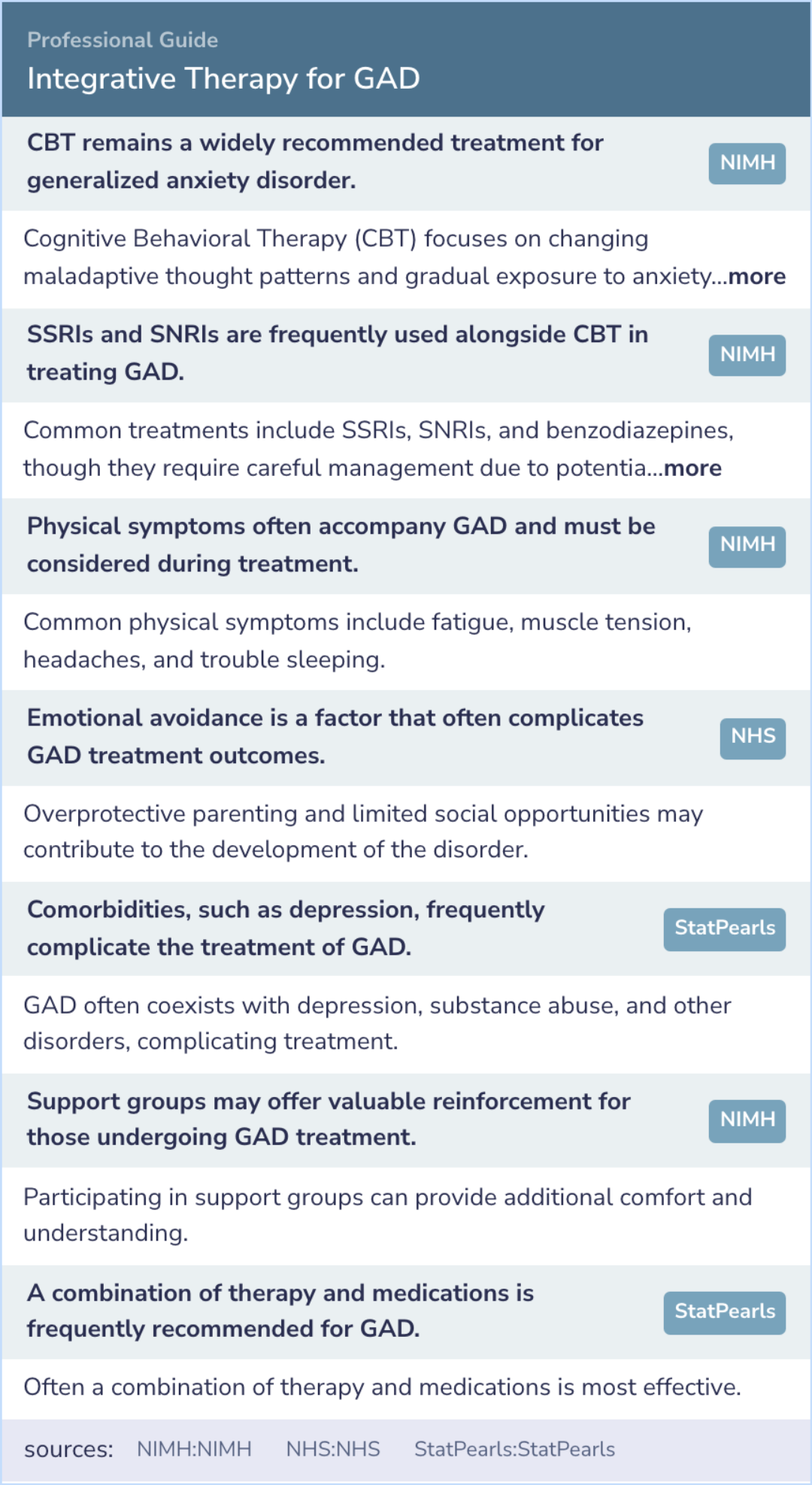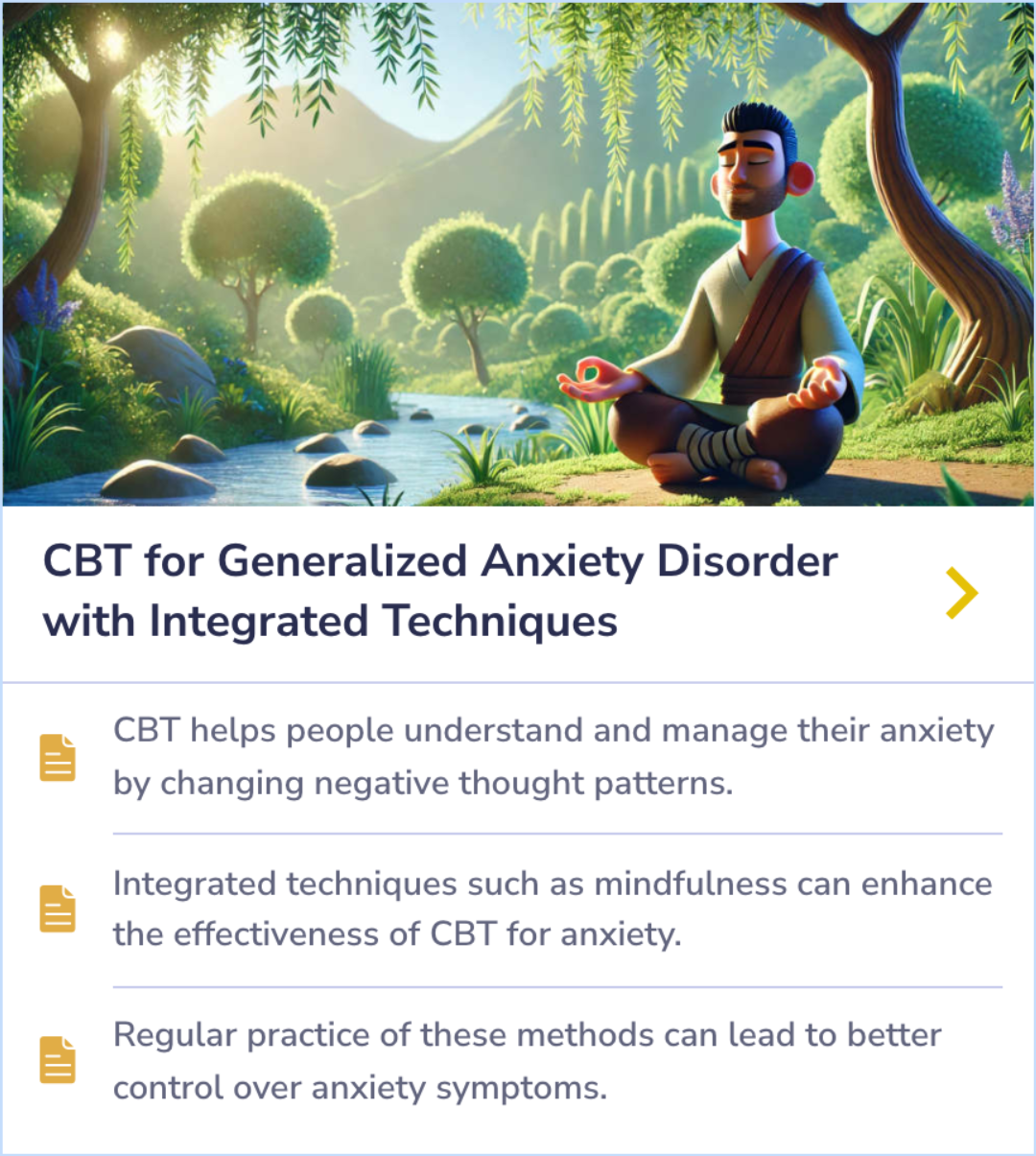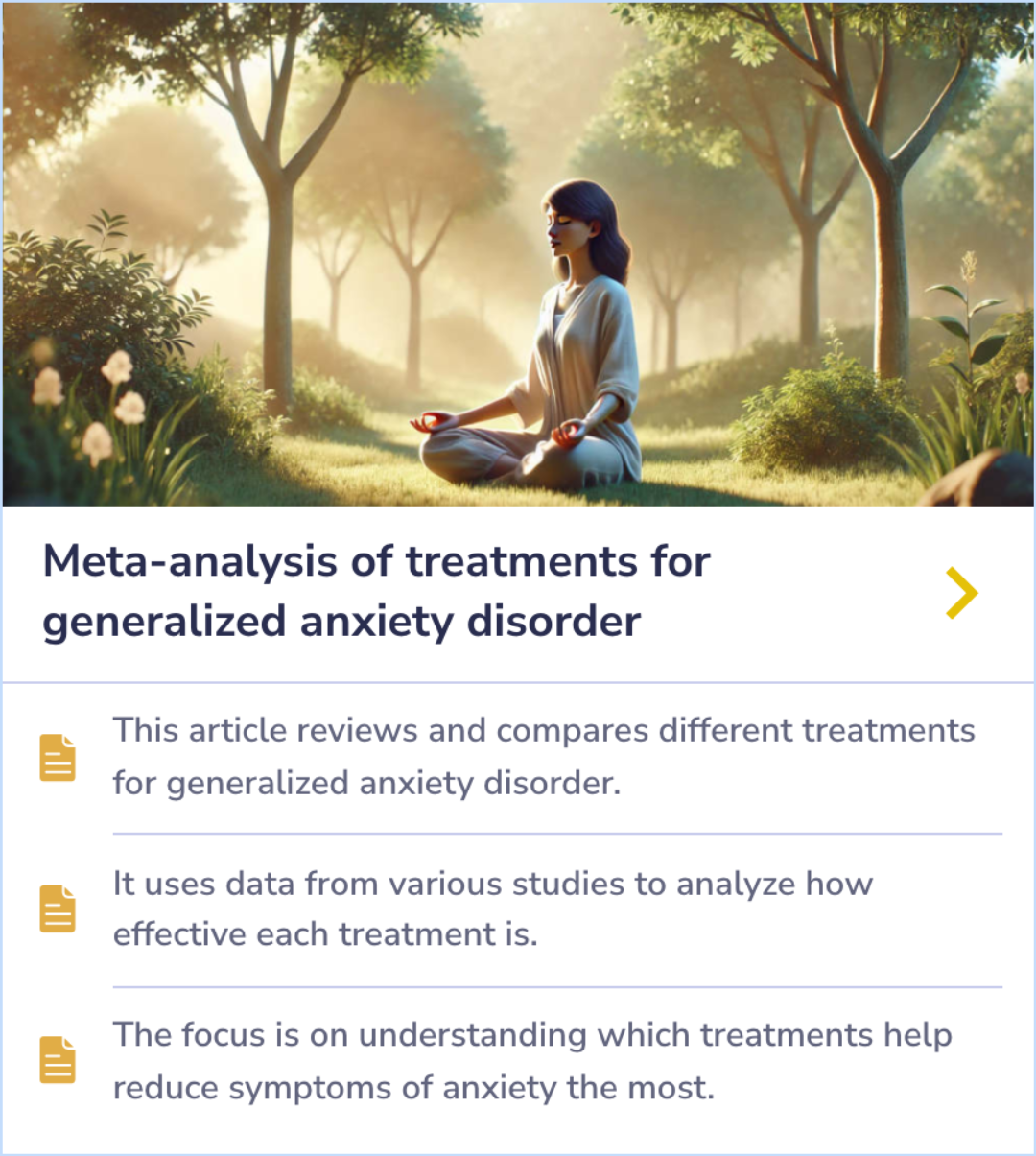Generalized Anxiety Disorder Papers
Visual Abstract
AN OPEN TRIAL OF INTEGRATIVE THERAPY FOR GENERALIZED ANXIETY DISORDER
Integrative Therapy for GAD
November 25, 2024
author
Newman MG, Castonguay LG, Borkovec TD, Fisher AJ, Nordberg SS
journal
Psychotherapy
Date Published
2008-06-01
Why link to a visual abstract?
What is a visual abstract?
Original
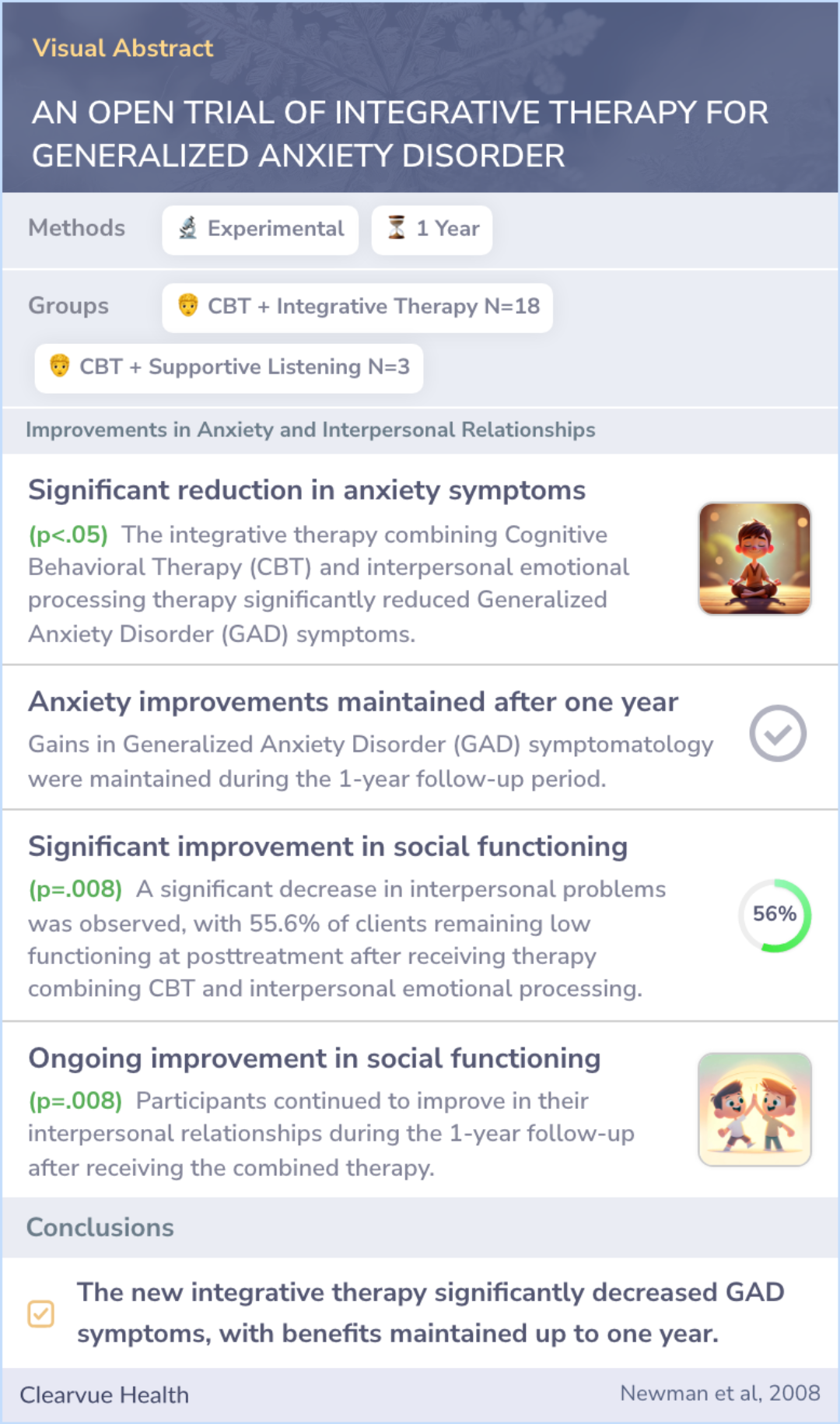
Study Summary
🔬
What They Studied
The study aimed to test a new therapy that combines Cognitive Behavioral Therapy (CBT) with techniques to address interpersonal problems and emotional avoidance for Generalized Anxiety Disorder (GAD).
💡
What They Found
The study found that the new therapy significantly decreased GAD symptoms, with benefits maintained up to one year.
📚
What This Means
These findings suggest that combining CBT with interpersonal emotional processing techniques is more effective for treating GAD compared to standard CBT alone, aligning with current evidence that CBT is a primary treatment for anxiety disorders.
Study Summary
Study Overview
This study examined the challenges faced by those with generalized anxiety disorder (GAD) and tested a new approach to therapy. It aimed to combine traditional cognitive-behavioral therapy (CBT) with techniques to address relationship and emotional issues, as these factors can worsen GAD symptoms. By doing so, the research explored how to enhance treatment effectiveness for individuals struggling with GAD.
Findings from the study suggest that existing CBT methods may not assess interpersonal dynamics or emotional responses adequately, and addressing these aspects may lead to better outcomes for patients.
Findings from the study suggest that existing CBT methods may not assess interpersonal dynamics or emotional responses adequately, and addressing these aspects may lead to better outcomes for patients.
Abstract: background
This study aimed to test the feasibility and preliminary efficacy of an integrative psychotherapy, combining CBT with techniques to address interpersonal problems and emotional avoidance.

Importance of Relationships in GAD
"Given that people with GAD worry predominantly about their relationships, their objective difficulty sustaining healthy relationships is likely to reinforce and maintain these worries."
Addressing Emotional Avoidance
"Taken together, psychopathology research and studies on predictors of change have suggested that although important interpersonal and emotional issues are involved in the etiology and/or maintenance of GAD, such issues do not appear to be adequately or fully addressed in current CBT protocols."
Integrative Therapy Approach
"This study aimed to test the feasibility and preliminary efficacy of an integrative psychotherapy, combining CBT with techniques to address interpersonal problems and emotional avoidance."
Study Summary
Methods
Eighteen participants underwent 14 sessions of the integrative therapy, which included both CBT and interpersonal emotional processing techniques. The sessions aimed at addressing not only anxiety symptoms but also associated interpersonal and emotional issues.
Additionally, three participants were given 14 sessions of CBT combined with supportive listening. This was done mainly for training and feasibility purposes, helping to refine the study's approach.
Additionally, three participants were given 14 sessions of CBT combined with supportive listening. This was done mainly for training and feasibility purposes, helping to refine the study's approach.
Abstract: methods
Eighteen participants received 14 sessions of CBT plus interpersonal emotional processing therapy and three participants (for training and feasibility purposes) received 14 sessions of CBT plus supportive listening.

Study Summary
Results
The study found that the integrative therapy led to significant reductions in GAD symptoms. Not only were these improvements sustained for up to a year, but they also appeared to be more effective than standard CBT alone.
Participants also experienced meaningful improvements in their interpersonal problems and emotional well-being. These positive changes continued to be observed during the one-year follow-up period.
Participants also experienced meaningful improvements in their interpersonal problems and emotional well-being. These positive changes continued to be observed during the one-year follow-up period.
Abstract: results
Results showed that the integrative therapy significantly decreased GAD symptomatology, with maintenance of gains up to 1 year following treatment. In addition, comparisons with extant literature suggested that the effect size for this new GAD treatm...more
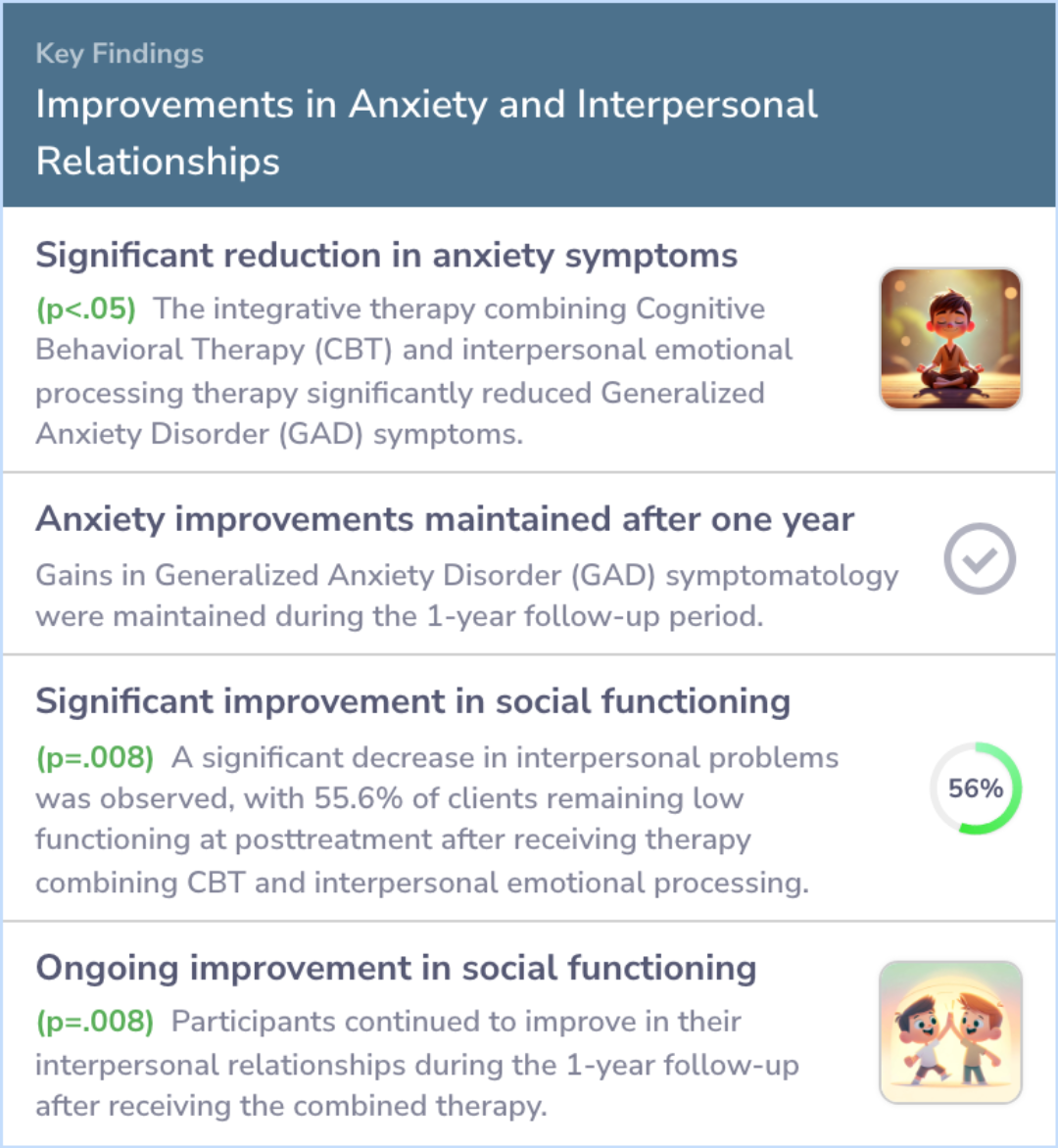
Study Summary
Conclusions
The findings suggest that combining CBT with methods to address interpersonal and emotional issues may offer added benefits for treating GAD. This integrative approach could lead to more sustained improvements compared to standard CBT.
The study opens the door for further research into how these combined therapies can be refined and implemented more broadly, potentially offering new avenues for effective mental health treatments.
The study opens the door for further research into how these combined therapies can be refined and implemented more broadly, potentially offering new avenues for effective mental health treatments.
Abstract: conclusions
Implications of these results are discussed.
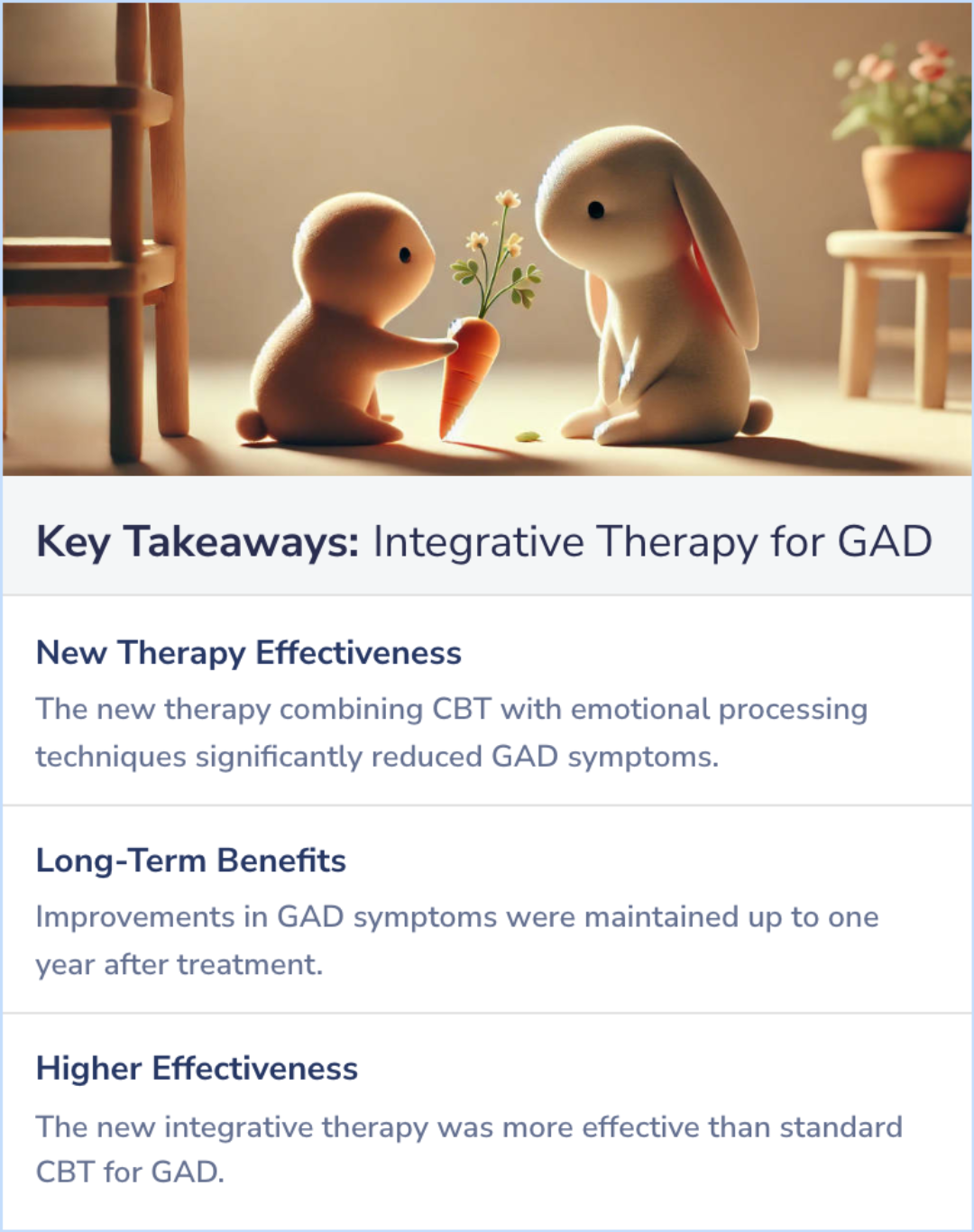
Background Information
Patient Guide
😟
Generalized Anxiety Disorder Overview
Excessive worry impacts daily life and is often managed with CBT and medications.
🧠
Challenges of CBT for GAD
CBT, though effective, has lower average effect size for GAD compared to other anxiety disorders.
🔗
Interpersonal and Emotional Avoidance
Interpersonal processes and emotional avoidance play a role in maintaining GAD, which are not sufficiently addressed by CBT.
📅
Diagnosis Criteria
Defined by excessive anxiety and worry more days than not for at least 6 months.
💭
Current CBT Approach
Focuses on changing maladaptive thought patterns and gradual exposure to anxiety-provoking situations.
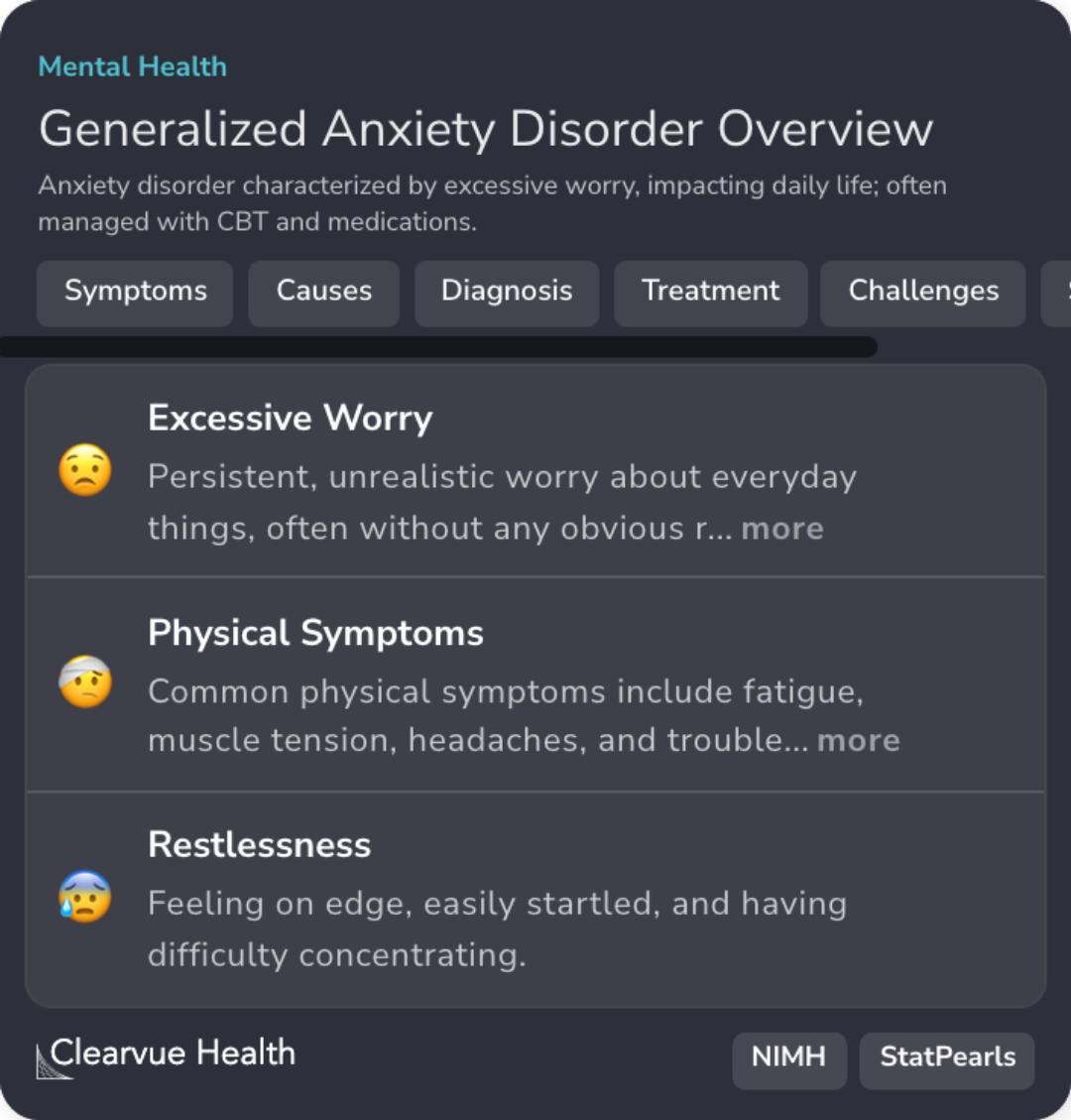
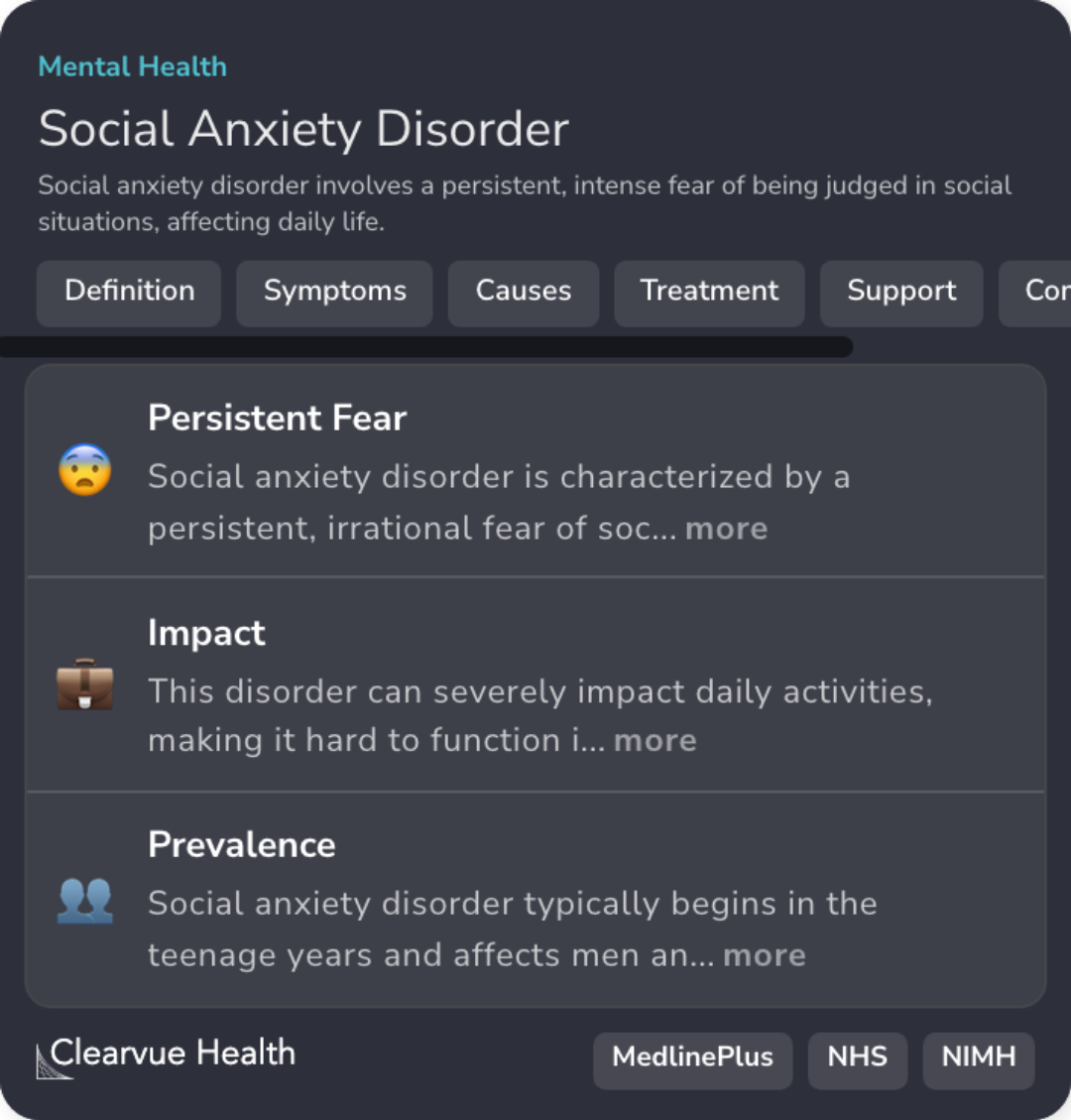
Professional Guide
Expert Opinion: Integrative Therapy for GAD
In line with the study's findings on the limitations of CBT for generalized anxiety disorder (GAD) alone, current professional recommendations state that CBT remains a widely recommended treatment for GAD, focusing on changing maladaptive thought patterns.
SSRIs and SNRIs are frequently used alongside CBT, requiring careful management due to potential side effects.
Additionally, physical symptoms such as fatigue, muscle tension, and trouble sleeping often accompany GAD and must be considered during treatment.
Emotional avoidance and limited social opportunities also complicate GAD treatment outcomes.
Comorbidities including depression and substance abuse further complicate the treatment of GAD.
Since GAD tends to be a long-term condition, addressing its chronic nature is necessary for effective management.
Support groups may offer valuable reinforcement, and a combination of therapy and medications is frequently recommended.
SSRIs and SNRIs are frequently used alongside CBT, requiring careful management due to potential side effects.
Additionally, physical symptoms such as fatigue, muscle tension, and trouble sleeping often accompany GAD and must be considered during treatment.
Emotional avoidance and limited social opportunities also complicate GAD treatment outcomes.
Comorbidities including depression and substance abuse further complicate the treatment of GAD.
Since GAD tends to be a long-term condition, addressing its chronic nature is necessary for effective management.
Support groups may offer valuable reinforcement, and a combination of therapy and medications is frequently recommended.
Evidence Summary
Mindfulness Enhances CBT for Anxiety Control
Cognitive Behavioral Therapy (CBT) can change the way people respond to anxiety by shifting negative thought patterns. Integrating mindfulness into therapy boosts its effectiveness, making it easier to control anxiety with practice.
Mindfulness, alongside CBT, offers a way to deepen therapy's impact. Practicing both techniques regularly helps improve control over symptoms of anxiety, offering a path toward managing GAD more effectively.
Mindfulness, alongside CBT, offers a way to deepen therapy's impact. Practicing both techniques regularly helps improve control over symptoms of anxiety, offering a path toward managing GAD more effectively.
Evidence Summary
Comparing Treatment Effectiveness for GAD
The article compares different treatments for generalized anxiety disorder, analyzing which methods most effectively reduce anxiety symptoms. Data from several studies is used to evaluate the effectiveness of each approach.
The focus is on determining which treatments are the most successful in helping to reduce symptoms of anxiety, providing a clear comparison across different therapeutic strategies and their outcomes.
The focus is on determining which treatments are the most successful in helping to reduce symptoms of anxiety, providing a clear comparison across different therapeutic strategies and their outcomes.
